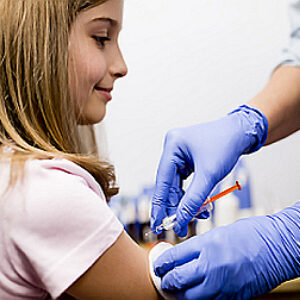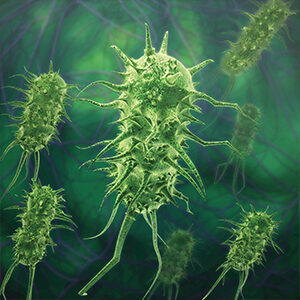Measles (Rubeola)
Measles is a serious and very contagious respiratory disease caused by a virus.
Overview
Measles is a serious and very contagious respiratory disease caused by a virus.1
Basics
Measles (rubeola) is a serious and very contagious respiratory disease caused by a virus.1 Measles was declared eradicated from the United States in 2000; however, cases and outbreaks still occur.2 As of March 2025, several states throughout the United States have detected measles cases and outbreaks.3
- See the Data
- Learn more about measles on the Centers for Disease Control and Prevention website.
Symptoms
Symptoms may appear 7-21 days after exposure and may include4,5:
- High fever (may spike to 104 °F or higher)
- Cough
- Running nose (coryza)
- Red, watery eyes (conjunctivitis)
- Rash
A typical case of measles begins with mild to moderate fever, cough, runny nose, red eyes, and sore throat.4 Two or three days after symptoms begin, tiny white spots (Koplik’s spots) may appear inside the mouth, but are not always present.
Three to five days after the start of symptoms, a red or reddish-brown rash appears.4 The rash usually begins on a person’s face at the hairline and spreads downward to the neck, trunk, arms, legs, and feet. When the rash appears, a person’s fever may spike to more than 104 °F. After a few days, the fever subsides and the rash fades.
People can spread measles from four days before until four days after the rash begins.2,5
Transmission
Measles is a highly contagious virus that lives in the nose and throat mucus of an infected person.6 It spreads when an infected person breathes, sneezes, coughs, or talks. It can contaminate surfaces and stay in the air for up to two hours. You can catch measles just by being in a room where a person with measles has been for up to two hours after that person left the room or by touching contaminated surfaces and then touching your eyes, nose or mouth. According to the Centers for Disease Control and Prevention, if one person in a room has measles, nine out of 10 people close by will become infected if they are not protected.1
Complications
Many people with measles have complications like diarrhea, ear infections, pneumonia, or acute encephalitis (an inflammation of the brain that can lead to convulsions and can leave a child deaf or developmentally delayed).4 Complications are more common in children under 5 years of age and adults older than 20.
- As many as one in five unvaccinated people in the United States who get measles is hospitalized.4
- One of every 20 children with measles gets pneumonia.4
- For every 1,000 children who get measles, nearly one to three children will die from respiratory or neurologic complications.4
- About one child out of every 1,000 who get measles will develop encephalitis (swelling of the brain).4
- Pregnant people who have not been vaccinated for measles are more at risk of miscarriage or premature births.4
As many as one in five unvaccinated people in the United States who get measles is hospitalized.4
In some cases, infection with measles can result in a very serious long-term complication known as subacute sclerosing panencephalitis, or SSPE.4 SSPE is a disease of the central nervous system resulting from a measles infection that occurred earlier in life. It typically develops seven to 10 years after recovery from infection, and, although it is rare, it is fatal.
Immunity After Infection
After illness, a person probably has lifelong immunity to measles.7
Risk Factors
Anyone born Jan. 1, 1957, or later who has not had measles or has not been vaccinated is susceptible to measles.1 Additionally, some groups are more at risk for severe illness and complications than others, including4:
- Children younger than 5 years
- Adults older than 20 years
- Pregnant people
- People with weakened immune systems
Diagnosis
Health care providers may suspect measles based on the symptoms a patient has, such as a rash and other symptoms and based on information the patient provides, such as recent travel to a location where measles is circulating.8 If your health care provider suspects you have measles, they will collect a nasopharyngeal swab, throat swab or urine or blood specimen to confirm their diagnosis.
Health care providers are required to report measles to their local health jurisdiction. In Spokane County, providers report cases to Spokane Regional Health District.
Learn more about what to do if you think you have measles.
Treatment
There is no specific treatment beyond bed rest, fluids, and control of fever.8 There may be additional treatment if complications develop. People infected with measles should isolate away from others for four days after the rash develops.
Prevention
The best way to protect yourself from measles is to get two doses of the measles, mumps and rubella (MMR) vaccine.9 There are two MMR vaccines available in the United States and an additional vaccine, MMRV, for children ages 12 months through 12 years. MMR and MMRV vaccines typically provide lifelong protection against measles and rubella. In some cases, immunity to mumps may decrease over time.9
Children
Children ages 12 months through 12 years of age should receive two doses of the MMR or MMRV vaccine, which includes measles, mumps, rubella and varicella (chickenpox) vaccines.9 they should receive the first dose at 12 to 15 months of age and the second at 4 to 6 years of age, before they enter school.10
Adults
Adults without evidence of immunity to measles should receive one to two doses of MMR vaccines, depending on risk factors.11 Doses should be given 28 days apart.9 Certain adults (such as health care workers, international travelers, or adults attending post high school educational institutions) should receive two doses of MMR vaccine.12
Pregnant women should not be vaccinated until after delivery.9
If You Have Evidence of Immunity: Presumptive Immunity
Presumptive immunity means that a person is presumed to be immune to a disease. If you are not sure if you need a measles vaccine, your health care provider will look for evidence of presumptive immunity, that is, certain clues that will help determine if you are immune to measles. Your doctor will consider the following10:
- Your birth year—adults born before Jan. 1, 1957, are assumed to be immune to measles because nearly everyone born before 1957 was infected with measles, mumps and rubella virus during childhood
- Documentation of vaccines for measles, mumps and rubella
- Laboratory evidence of immunity
- Laboratory confirmation of disease
Who Should Get Vaccinated?
It is important for all children and adults who do not have evidence of immunity to measles to receive a measles vaccine.9 Nearly everyone who does not have immunity to measles will become infected if exposed to the virus.
Measles vaccines are recommended for specific groups who do not have evidence of immunity to measles including10:
- College students
- International travelers
- Health care personnel
- Close contacts of immunocompromised people
- People who are infected with HIV who are not severely immunocompromised (CD4 count ≥ 200)
- Adults who received the inactivated measles vaccines between 1963 to 1967
- Groups at increased risk during measles outbreaks
Who Should Not Get Vaccinated?
Certain people should not get an MMR vaccine, or, in some cases, they may need to wait.9 Speak to a health care provider if you or a family member9:
- Have had a severe allergic reaction (anaphylaxis) after a previous dose of MMR or MMRV vaccine or to one of the ingredients in the vaccine
- Have severe immunodeficiency, due to medical treatments such as chemotherapy or long-term immunosuppressive therapy, or medical conditions such as hematologic and solid tumors, congenital immunodeficiency, or HIV infection5
- Is or may be pregnant
- Have a weakened immune system due to disease or medical treatments or a history of immune system problems5
- Received antibody-containing blood product within the last year5
- Have tuberculosis9 or will be getting tested for tuberculosis in the near future; you can receive the vaccine before having a TB test, but if you have had a TB test, you must wait 28 days to receive the MMR vaccine5
Need Help Deciding If You Need the MMR Vaccine?
Use this flowchart to help you decide.
Washington State Data
The highest number of cases reported in Washington state within the last 10 years was in 2019. Two large outbreaks and four non-outbreak cases resulted in 90 confirmed cases across four counties.11,13
Recommendations
You can take steps to prevent the spread of measles.
Vaccination
Getting vaccinated for measles is the best way to stay protected9:
- Protect your children by having them vaccinated.
- Protect yourself by making sure you have immunity to measles.
If You Have Been Exposed to Measles and Are Not Vaccinated
If you have been exposed to measles and do not believe you have immunity, it may be possible to take additional steps to protect your health after exposure.9
- You may receive some protection by getting the MMR vaccine within 72 hours of exposure.9 This may help to give you some protection and possibly lessen the severity of your symptoms.
- Your health care provider may also recommend that you receive a treatment called immunoglobulin (IG), a type of antibody treatment, within six days of being exposed.9 This may also provide some protection and reduce your symptoms. IG is for certain groups of people who are not able to receive the MMR vaccine.14(pp17)
- If you think you might have been exposed to measles and need to seek health care, call ahead so appropriate measures can be taken to protect other patients and staff.
If You Have Measles or Think You Have Measles
Measles is more than just a rash, and it can be dangerous for babies and children.4
- If you or someone in your household has measles, call your health care provider as soon as possible.
- If you think you might have measles and need to seek health care, call ahead so appropriate measures can be taken to protect other patients and staff.
- Depending on when your rash developed, you may need to isolate for four days.
- Your doctor will recommend options for treatment.
- You will be contacted by public health. If you live in Spokane County, you will be contacted by a disease investigator at Spokane Regional Health District. They will help you to determine who else may have been exposed so that they can be notified and offered vaccination if needed. The investigator will also help you determine any other important next steps.
- About Measles. Centers for Disease Control and Prevention. May 29, 2024. Accessed March 6, 2025. https://www.cdc.gov/measles/about/index.html
- How Measles Spreads. Centers for Disease Control and Prevention. April 18, 2024. Accessed March 7, 2025. https://www.cdc.gov/measles/causes/index.html
- Measles Cases and Outbreaks. Centers for Disease Control and Prevention. February 28, 2025. Accessed March 7, 2025. https://www.cdc.gov/measles/data-research/index.html
- Measles Symptoms and Complications. Centers for Disease Control and Prevention. May 9, 2024. Accessed March 7, 2025. https://www.cdc.gov/measles/signs-symptoms/index.html
- Gastanaduy P, Haber P, Rota P, Patel M. Chapter 13: Measles. In: Epidemiology and Prevention of Vaccine-Preventable Diseases. Centers for Disease Control and Prevention. Updated April 24, 2024. Accessed March 10, 2025. https://www.cdc.gov/pinkbook/hcp/table-of-contents/chapter-13-measles.html#cdc_report_pub_study_section_9-contraindications-and-precautions-to-vaccination
- How Measles Spreads. Centers for Disease Control and Prevention. April 18, 2024. Accessed March 7, 2025. https://www.cdc.gov/measles/causes/index.html
- Hagen A. Measles and Immune Amnesia. American Society for Microbiology. May 18, 2019. Updated February 7, 2024. Accessed March 7, 2025. https://asm.org/articles/2019/may/measles-and-immune-amnesia
- Clinical Overview of Measles. Centers for Disease Control and Prevention. July 15, 2024. Accessed March 6, 2025. https://www.cdc.gov/measles/hcp/clinical-overview/index.html
- Measles Vaccination. Centers for Disease Control and Prevention. January 17, 2025. Accessed March 7, 2025. https://www.cdc.gov/measles/vaccines/index.html
- Measles Vaccine Recommendations. Centers for Disease Control and Prevention. September 20, 2024. Accessed March 7, 2025. https://www.cdc.gov/measles/hcp/vaccine-considerations/index.html
- Communicable Disease Annual Report Incidence Rates. DOH 420-004. Washington State Department of Health; December 2024. Accessed March 7, 2025. https://doh.wa.gov/sites/default/files/legacy/Documents/5100/420-004-CDAnnualReportIncidenceRates.pdf
- Measles, Mumps, and Rubella (MMR) Vaccination: What Everyone Should Know. Centers for Disease Control and Prevention. Updated January 26, 2021. Accessed March 7, 2025. https://www.cdc.gov/vaccines/vpd/mmr/public/index.html
- 2023 Communicable Disease Report. DOH 420-004.Washington State Department of Health; December 2024. Accessed March 7, 2025. https://doh.wa.gov/sites/default/files/2024-12/420-004-CDAnnualReport2023.pdf
- McLean HQ, Fiebelkorn AP, Temte JL, Wallace GS. Morbidity and Mortality Weekly Report June 14, 2013: Prevention of Measles, Rubella, Congenital Rubella Syndrome, and Mumps, 2013. Summary Recommendations of the Advisory Committee on Immunization Practices (ACIP). Centers for Disease Control and Prevention, June 14, 20213. Accessed March 17, 2025. https://www.cdc.gov/mmwr/pdf/rr/rr6204.pdf

Make It a Routine for Life
Learn about what immunization is, why it's important, and when to get certain vaccines.

Communicable Disease Investigation & Prevention (CDIP)
Epidemiologists monitor, track, and respond to infectious disease in the community to prevent spread of illness.

